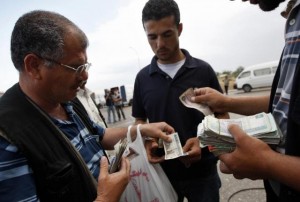
(AFP Photo)
The Central Agency for Public Mobilisation and Statistics (CAPMAS) has revealed that the consumer inflation rate increased to 8.2% in February.
Market research company TNS conducted a field study to understand Egyptians’ perceptions of inflation and its impact.
According to the study, 100% of Egyptian respondents confirmed that they have seen a significant price increase in most commodities. While necessary commodities’ price increases are felt across all income levels, it is felt most by those who have an income of below EGP 2,000.
Most respondents saw a price increase in necessary commodities, with 79% describing this. 66% of respondents had noticed an increase in grocery prices; 39% in household utility bills; and 33% in transportation costs.
Tamer El-Naggar, TNS CEO for Egypt and North Africa, said that the recent price inflation was largely driven by broad-based increases in food and non-food prices. The Egyptian pound, which has lost more than 10% of its value against the dollar since last year, pushed up the cost of imported goods and contributed to inflation which grew to 8.2% in February from 6.3% in January.
82% of those surveyed believe that the price increases will impact their lifestyles and spending habits. 44% of the respondents believe that the price increase is due to the political and economic situation in Egypt, while 10% believe it is a normal increase. Of those blaming the price increase on political and economic tensions, 28% believe that the political unrest is the main reason for price increases and 18% believe it is due to the bad economic situation. 8% believe it is due to the devaluation of the Egyptian Pound.
While 28% of respondents, especially those in higher age groups and income level brackets of more than EGP 2,000, were planning to invest in real estate before the price increase, only 6% are now planning to invest. 27% were planning to buy a car, but this figure has fallen to 6%. Business investment plans shrunk from 7% to 1%, and family vacations also fell from 8% to 1% after the price increases.
“We have also found that 86% of the respondents are expecting another wave of price increases in the near future. Egypt’s political turmoil continues to affect the economy, which is severely strained because of the challenges in reserves, the foreign exchange problem, the lack of foreign direct investments, and the growing inflation rates,” added El-Naggar.




